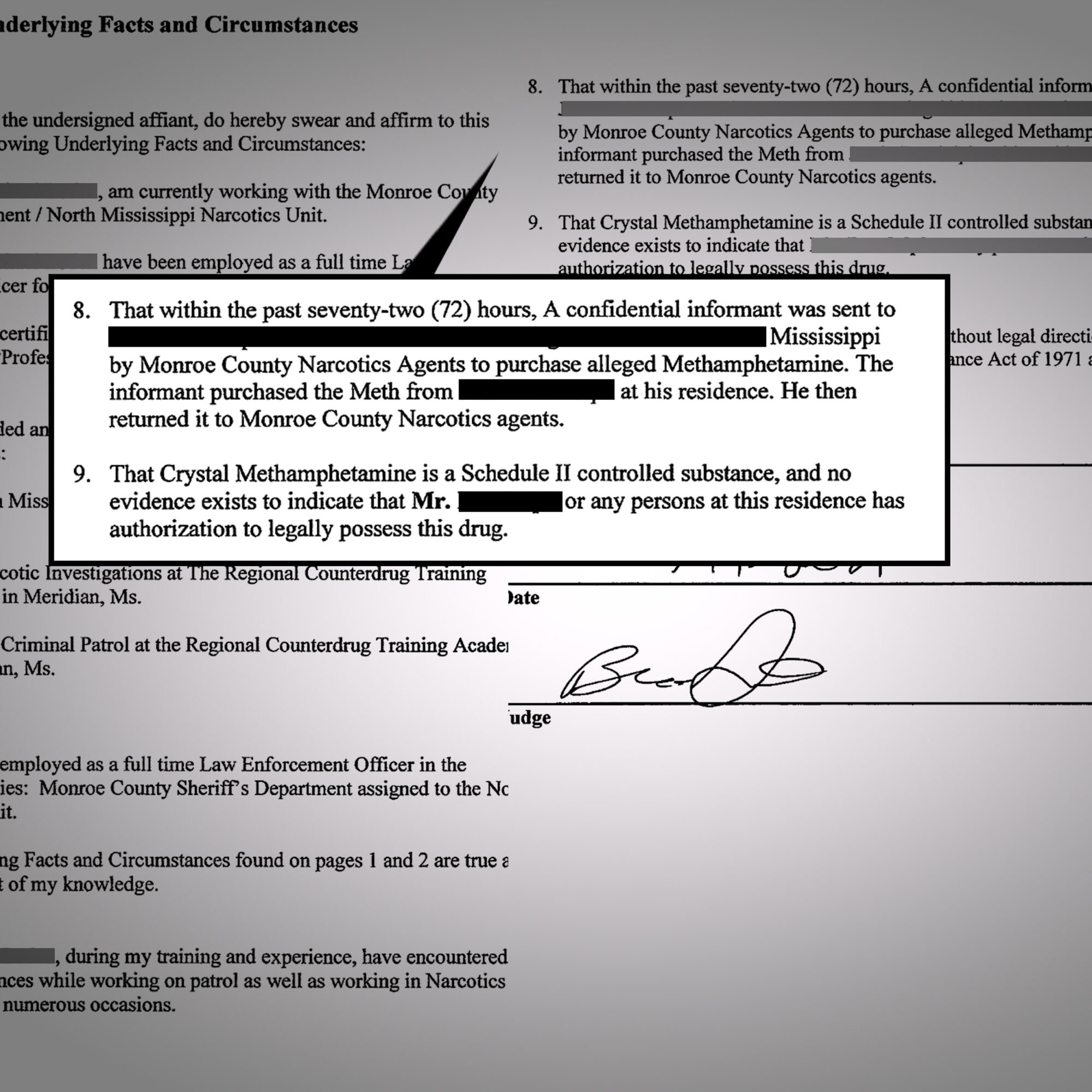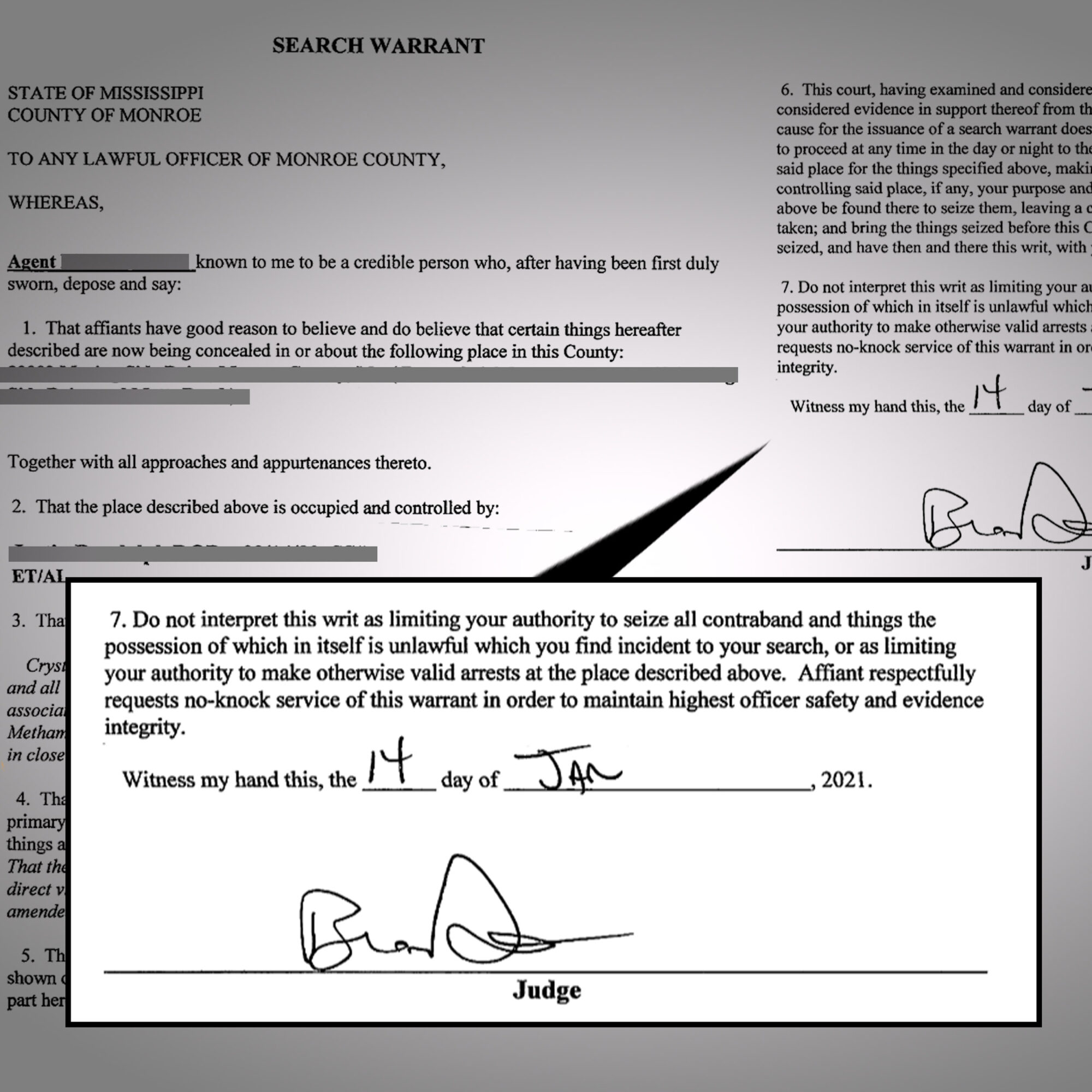Mississippi Today
Mississippi’s no-knock raids have led to death and injury. Dozens of warrants lacked clear justification.
by Caleb Bedillion, The Marshall Project, Mississippi Today
March 20, 2025
This article was published in partnership with The Marshall Project, a nonprofit news organization covering the U.S. criminal justice system, and the Daily Journal. Sign up for The Marshall Project’s Jackson newsletter, and follow them on Instagram, TikTok, Reddit and Facebook.
During a 2015 no-knock drug raid in Mississippi’s rural northeast corner, sheriff’s deputies shot and killed 57-year-old Ricky Keeton after he came to the door with an air pistol as SWAT team members forced their way into his trailer home at 1 a.m.
Keeton’s death received little public attention at the time. Keeton’s three daughters sued, arguing that Monroe County deputies had no constitutional authority that night to burst into their father’s home with a battering ram and pry bar without first knocking and identifying themselves.
The federal wrongful death suit was settled seven years later for $690,000. This came after several judges refused to dismiss the lawsuit, ruling the defendants failed to prove there was any legal justification for the no-knock raid in the first place. The county and sheriff’s department made no admission of wrongdoing in the settlement.
Five years after Keeton’s death, no-knock searches faced increased national scrutiny after police shot and killed Breonna Taylor in Louisville, Kentucky, during a March 2020 raid in which her boyfriend shot and wounded an officer. The boyfriend later said he thought they were intruders. Similarly, Keeton’s girlfriend said that Keeton “thought somebody was breaking in” before he was shot to death.
Taylor’s shooting death ultimately amplified longstanding, bipartisan demands for reform of no-knock raids. Several states limited no-knock searches, including Kentucky, Tennessee and Virginia.
Mississippi has a history of no-knock searches — with dangerous results. Police have raided the wrong homes, and in one 2020 case, officers even shot and wounded an unarmed person visiting a targeted home.
Yet as other states tightened their no-knock search laws, Mississippi officials did nothing.
Since the Keeton killing in 2015, judges in six courts across the state have approved at least 62 no-knock search warrants that failed to show that they met basic constitutional standards, an investigation by The Marshall Project – Jackson and the Northeast Mississippi Daily Journal found.
The news organizations showed copies of the warrants from across the state to legal experts including attorneys, law professors and former federal magistrates. The experts agreed that most of the search warrants and affidavits showed no written legal justification for the no-knock warrants.
One of those courts was in Monroe County, where, for years after Keeton’s death and the lawsuit that followed, some county-level judges continued to sign what experts deemed legally threadbare no-knock search warrants.
The Supreme Court has ruled that to obtain a no-knock search warrant from a judge, police must show that the search target is dangerous or might try to run away or destroy evidence. Experts said the vast majority of warrants and affidavits gathered by The Marshall Project – Jackson and the Daily Journal didn’t state an adequate reason — if they had one at all.
“You’ve got a real mess on your hands,” said Henry Schultz, a Wisconsin-based attorney who reviewed those files for the news outlets. Some 25 years ago, Schultz helped argue the key 1997 case in which the U.S. Supreme Court required specific limits on no-knock searches.
Pointing to the search warrants from Mississippi, Schultz said the high court’s attempt to put guardrails around no-knock raids nearly three decades ago isn’t working.
There has never been a public survey of no-knock warrants in Mississippi, where many courts block access to search warrant records.
After rising scrutiny focused on Monroe County, including this reporting effort, officials there scuttled the use of boilerplate no-knock search warrant requests about two years ago.
In at least two other Mississippi courts, no-knock search warrants dropped off in recent years, according to records reviewed this year by the news outlets.
Beyond these local changes, there’s still no broader oversight of how judges in the state handle no-knock requests and no easy way to check up on them.
With no statewide restrictions, judges can disregard Supreme Court precedent at any time, with few consequences.
Judges across the country have largely avoided the same level of scrutiny that has fallen on police departments and even prosecutors over no-knock warrant abuses, said Christy Lopez, a former U.S. Department of Justice attorney, and one of the legal experts who reviewed the news outlets’ findings.
She said the investigation in Mississippi by The Marshall Project – Jackson and the Daily Journal shows that judges must reckon with their share of the responsibility.
“Judges,” said Lopez, “are really failing people on no-knocks.”
In January 2020, Brandon Davis traded his deputy sheriff’s badge for a judge’s gavel after defeating an incumbent’s bid for reelection. By then, litigation over Ricky Keeton’s death was entering its fifth year.
Davis joined the bench of the Monroe County Justice Court with another newly elected judge, Sarah Cline Stevens, an attorney specializing in family law matters. Her legal education is a rarity among justice court judges in Mississippi. These judges aren’t required to be lawyers and usually only hear small civil claims and misdemeanor criminal matters. They can also sign search warrants.
During a career of more than a decade-and-a-half in law enforcement, Davis joined many no-knock raids with the Monroe County Sheriff’s Office. In some cases, he prepared the actual applications and presented them to a judge. He didn’t play any role in the Keeton raid.
The same month he took office, court records show, Davis signed a search warrant for a Monroe County deputy.
It authorized no-knock entry.
It also repeated the major flaws of the search warrant used in the Keeton raid.
The only reference to a no-knock entry was a boilerplate sentence near the end of the search warrant — a sentence that has appeared in Monroe County search warrants in some form over many years: “The above affiant respectfully requests a no-knock search due to officer safety and the protection of further evidence.”
Neither the warrant that Davis signed nor the written affidavit that’s required to support it offered any detailed, written reasons for the no-knock request.


U.S. District Judge Sharion Aycock zeroed in on the lack of any details, written or otherwise, in the Keeton no-knock warrant during the family’s lawsuit against Monroe County and sheriff’s deputies.
“The Defendants have failed to bring forth any evidence that announcing their presence, ‘under the particular circumstances’ was dangerous,” Aycock wrote in a 2018 order dismissing Monroe County’s motion to drop the case.
The U.S. 5th Circuit Court of Appeals agreed with Aycock a year later.
Monroe County Justice Court Judge Stevens, a lawyer, was aware of the Keeton litigation when she joined the bench, and said in a 2022 interview that she studied the legal issues involved.
The homework paid off.
She received a search warrant application in February 2020. It contained the boilerplate no-knock request. She signed it, but only after handwriting additional notes on the affidavit, culled from an interview of the officer: The targeted person had been served two prior search warrants before and “he came to the door with a gun (sawed off shotgun and pistol).” A confidential informant also told officers, “Weapons are currently present.”
![A search warrant with two blocks of highlighted text that read: “The confidential informant also sent pictures of methamphetamine inside the residence and the shop behind the residence to Agent [redacted],” and “8. That within the past seventy-two (72) hours, a confidential informant contacted Agent [redacted] with the Monroe County Sheriff’s Department and stated that at [redacted] had methamphetamine inside the residence and inside the shop behind the residence.” Judge Sarah Stevens’ initials are signed near both highlighted texts.](https://cdn.mississippitoday.org/wp-content/uploads/2025/03/19215558/250319-NOKNOCKS-Annotation-Stevens-1-v3.jpg)
![A search warrant with highlighted text that shows handwritten notes by Justice Court Judge Sarah Cline Stevens: “Suspect [redacted] has previously been the person of interest under search warrants and on two different occasions he came to the door with a gun (sawed off shotgun and pistol). Highly probable that suspect will attempt to dispose of the drugs etc. if their presence is announced. Suspect is armed and dangerous. CI stated that weapons are currently present.”](https://cdn.mississippitoday.org/wp-content/uploads/2025/03/19215558/250319-NOKNOCKS-Annotation-Stevens-2-v4.jpg)
That’s the level of specific detail that the Supreme Court’s 1997 ruling, Richards v. Wisconsin, requires, experts agreed. Lopez, the former Justice Department attorney, said the high court set a fairly low bar — too low in her view.
Nonetheless, for years, most no-knock search warrants in Monroe County failed to clear even that low bar.
The news organizations found 14 no-knock warrants signed by Monroe County Justice Court judges since 2015, with the last such warrant found in late 2022. Since 2020, when Davis and Stevens joined the bench, court records show 11 no-knock search warrants have been signed, almost all of them by Davis, the former sheriff’s deputy.
Experts said they found all but one warrant lacking adequate written justification. Stevens signed the one with adequate support, as well as one of the 11 without adequate written support. Davis signed most of the rest, with a third judge, Adrian Haynes, signing only one. Haynes did not respond to a request for comment.
Judges and the court clerk said that the court records reviewed by The Marshall Project – Jackson and the Daily Journal are incomplete, meaning the judges may have signed even more no-knock search warrants.
Stephen Smith, a retired federal magistrate from Texas, often reviewed search warrant applications during his judicial career. After looking at some of the Monroe County search warrants, he said he wouldn’t have signed them as no-knock searches.
“Every one of these granted no-knock authority,” he said, “and only one attempted to justify it.”
In a 2022 interview, Davis said he was granting no-knock search warrants to preserve officer safety and to prevent the destruction of evidence, though neither the search warrants nor the affidavits showed sufficient written evidence from the cases at hand to support those justifications.
Davis said that he often discussed a search warrant affidavit with the requesting officer, but that he didn’t document the conversations in writing. In Mississippi, judges can rely on sworn oral testimony beyond the affidavit in support of a search warrant. There’s no requirement to document it in writing, but Davis said that in mandatory training sessions for justice court judges that he attended, the judges were advised to do so.
“They’re telling us, you really need to include this, it needs to be on paper,” Davis said.
Jeffrey B. Welty, who teaches law in North Carolina and also helps train judges there, strongly advises against interviewing officers about their applications, especially if it won’t be documented in some fashion.
“Don’t have them tell you a bunch of stuff about the case that doesn’t appear in the application, because that’s just fraught with peril,” Welty said he tells judges. “That doesn’t seem like a good judicial practice to me.”
Davis also described approving search warrants in some cases based on his knowledge of suspects from his career in law enforcement. But judges should not rely on their own knowledge of people or places described in a warrant application; they should consider information supplied by the officer, said William Waller Jr., a retired justice of the Mississippi Supreme Court.
In response to Waller and others who reviewed his warrants, Davis in early 2025 said that he stands by the fairness of his process.
“Opinions are just that, opinions. That’s what you got when you asked other retired judges or lawyers,” said Davis. “If I am wrong, then why have I not been disciplined?”
He also added, “If the people don’t like my decisions, then they can elect another judge next election.”
Over the course of a years-long reporting effort by The Marshall Project – Jackson and the Daily Journal, Monroe County’s judicial practices changed.
After that 2022 interview by the news organizations with Davis and Stevens, Davis began amending applications for no-knock search warrants with handwritten notes, though experts said they found his level of detail was still lacking. In 2023, Davis said he was doing so because of increasing scrutiny on courts.
“The last thing I want is for anybody to question my decision on something,” said Davis in 2023. “You have more people now that’s looking at the judicial system.”
A new sheriff, Kevin Crook, took office in 2020, the same year Davis and Stevens joined the bench. Crook, a former sheriff’s deputy and justice court judge, soon began to field questions about the county’s no-knock practices as local and national news investigations scrutinized the county amid the rising national outrage that year over Breonna Taylor’s death.
Crook told The Marshall Project – Jackson and the Daily Journal in 2023 that the no-knock search warrants located by the news organizations weren’t always executed as no-knock searches and that his department was moving away from what he deemed “crazy tactics” used by the department when executing no-knock search warrants in years past.
In 2023, Davis also said that he was seeing fewer no-knock search warrant requests from officers.
And after those 2023 interviews, officials changed course even further.
“We took the language out,” Crook said in early 2025, referring to the boilerplate language in previous no-knock warrants. “If we need it, we are going to explain to the judge why we need it.”
Search warrants on file with the court bear this out. The boilerplate no-knock language disappeared from search warrants. The judges also instituted an on-call rotation to handle search warrant applications, an initiative intended in part to prevent the appearance that deputies were taking their warrant applications directly to a favored judge.
“This has been an issue that has brought a lot of negative light to our county,” said Stevens. “It’s something that I’ve been very sensitive to from the beginning of my first term.”
About an hour up the road from the courthouse where Davis and Stevens preside sits the Pontotoc County Justice Court, nestled in the Hills Region of northeast Mississippi.
Court records in Pontotoc County show that the justice court’s two long-serving judges, David Hall and Scottie Harrison, together signed 33 no-knock search warrants from 2020 through 2023.
After an apparent reorganization of the county’s drug task force in late 2023, court records do not show the authorization of any more no-knock searches.
But for the records examined from 2020 through 2023, no-knock searches were almost half of all search warrants found in court records. Almost all of the search warrants examined in drug cases contained no-knock permission.
Legal experts who reviewed the documents agreed that with only three exceptions, those Pontotoc County search warrants lacked written justification for no-knock entry because they failed to offer any facts to support the claim that officers might be in danger, or that suspects might escape or destroy evidence. In some cases, those experts said there didn’t even appear to be adequate written justification for a search warrant of any kind.
Hall and Harrison did not respond to requests for comment.
Including Pontotoc and Monroe counties, the news organizations found 91 no-knock search warrants, with 62 of those warrants deemed legally defective by experts . These warrants were signed by 10 judges in six jurisdictions from across the state from 2015 through 2023.
In total, the news organizations reviewed records from 20 courts looking for no-knock search warrants, reviewing thousands of pages of court filings and submitting dozens of public record requests.
Many of these no-knock search warrants contained no explanation for why a no-knock search was needed, either by the issuing judge or the requesting officer.
“Facts matter; specifics matter,” said Brian Owsley, a retired federal magistrate judge from Texas who signed hundreds of search warrants while on the bench. “Are the targets dangerous? Are they armed? Are they armed and apt to shoot?”
That’s where Mississippi’s no-knock search warrants so often go wrong.
“In these warrants, I don’t really see that discussion at all,” Owsley said.
Other search warrants offer only meager supporting evidence, including anonymous phone calls or old information. Some of these warrants were directed toward locations where a no-knock entry doesn’t seem necessary. In Pontotoc County, Hall signed two no-knock warrants authorizing searches of gas stations. The written application didn’t request no-knock authority.
Two search warrants signed by Ricky Farmer, a former justice court judge in Stone County, near the Gulf Coast, authorized no-knock entry to search unoccupied cars at towing lots. These applications also didn’t ask for no-knock permission.
Some warrants were rife with sloppiness and sometimes even possible errors, said several experts, including Welty, who trains judges in North Carolina.
Another warrant from Stone County signed by Farmer directed officers to search one address in the warrant, but the requesting affidavit contained an entirely different address outside the judge’s jurisdiction. The mistake was likely due to a copying error on the warrant.
Farmer did not respond to requests for comment.
Unlike justice courts in Pontotoc and Monroe counties, some courts offered a more mixed bag. In the Southaven and Greenville municipal courts, the news organizations found a number of no-knock search warrants that did contain sufficient written justification alongside a few warrants that experts said did not.
In Southaven, municipal court judges haven’t issued a no-knock search warrant since 2020.
Unlike justice court judges, municipal court judges in Mississippi typically have law degrees.
But whether these kinds of warrants are rising, declining or holding steady, judges should handle no-knock requests with particular care given the potentially dangerous and even lethal consequences, said civil rights attorneys and legal experts.
For a judge to do otherwise, said Lopez, the former Justice Department attorney, is “shocking” and shows “no sense of the potential harm of what they’re doing.”
In the Mississippi city of Vicksburg, an elderly couple sued after state narcotics agents raided their home by mistake with a no-knock search warrant in hand and forced them onto the ground at gunpoint. A judge awarded them $50,000 in 2019. Two other lawsuits in the state involving death or serious injuries during no-knock raids have been settled since 2022, including the Keeton litigation. Two additional lawsuits over no-knock raids remain ongoing, including a case in Jones County involving mistaken entry at the wrong apartment.
The search warrant problems uncovered by this investigation are by no means unique to Mississippi. Welty conducted a similar review of no-knock search warrants in North Carolina. He said the legal justifications offered were better than the Mississippi search warrants he reviewed, but they were still sometimes thin.
In 2018, a Washington Post columnist found search warrants from Arkansas lacking any legally sufficient reason for no-knock entry. A larger investigation in 2020 by the news outlet found hasty, superficial reviews of no-knock search warrant applications across the county.
Even the search warrant used in the deadly Breonna Taylor raid — one of five similar no-knock search warrants police had obtained — lacked legal justification for a no-knock entry, according to some legal observers.
Looking back at his involvement in the key 1997 case from the U.S. Supreme Court, Schultz, the attorney in Wisconsin, said the ruling felt significant at the time.
“For a while, it looked like things were going to change,” he remembered.
But in a later 2006 opinion, the high court said that even when police unlawfully force their way into a home, they can still use evidence seized in the raid. Other violations of the Fourth Amendment typically bar prosecutors from using any evidence seized in court.
Civil rights advocates have frequently blamed that 2006 ruling for undermining the significance of prior rulings limiting no-knock entries.
Schultz agreed. Taking stock of the Mississippi search warrants he reviewed and the absence of larger reforms in the state as well as many other parts of the country, that 1997 Supreme Court ruling often doesn’t feel like it matters much anymore.
“We’re back to where we were,” said Schultz. “It’s kind of depressing that we would be in this spot.”
Some reporting for this article was done with the support of ProPublica’s Local Reporting Network.
How we reported the story
No one tracks or monitors search warrants in Mississippi. Statewide rules for courts do require that search warrants must be returned to court, however, and filed by the clerk.
As previously reported by the Northeast Mississippi Daily Journal and ProPublica, many courts violate court rules and don’t actually have these records. Others do have them on file but refuse to make them available to the public.
However, The Marshall Project – Jackson and the Daily Journal continued a years-long effort to obtain search warrants where they were available. We visited courthouses and looked through thousands of pages of court files, scoured electronic court records and submitted dozens of public records requests.
Ultimately, we gathered search warrants from 20 different jurisdictions, focusing primarily on justice courts, where judges often have no law degree and frequently authorize search warrants, but also including some municipal courts.

Some document caches were well-organized and went back many years. In other places, clerks had incomplete records, or even no records, and we only obtained a few search warrants.
Of the 20 courts where we obtained search warrants, six had at least some no-knock search warrants. Pontotoc County Justice Court and the Greenville Municipal Court each had more than 20.
In some of the places where the news organizations found some no-knock search warrants, search warrant records are not widely available from the court, making it difficult to assess how frequently no-knock search warrants have been issued or if they are still being issued.
The final reporting looked only at search warrants signed within the last decade.
In some counties with lawsuits over alleged no-knock raids, including Coahoma County, there were no judicially authorized no-knock search warrants among the court records. In other places with no-knock search warrants among the files, including Monroe County, law enforcement officials claimed that such warrants aren’t always, or even normally, executed as no-knock searches.
Law enforcement officers can also execute a standard knock-and-announce search warrant with a no-knock entry based on emergency conditions at the time the warrant is executed.
We asked eight legal experts to review the warrants and accompanying affidavits that we found and to evaluate their legal justification under the requirements of the U.S. Supreme Court’s ruling in a 1997 case, Richards v. Wisconsin.
These experts included retired federal magistrates, who frequently handled search warrant requests from the federal bench, as well as practicing attorneys and law professors.
No one expert reviewed the entire batch of records. To ensure a diversity of viewpoints, we showed some of the same search warrants to multiple experts. Experts consistently agreed about which no-knock search warrant requests were justified with written support and which were not.
Here are the places where we found no-knock search warrants, with the total number of no-knock search warrants since 2015 and the total number of no-knock search warrants without written support:
Greenville Municipal Court: 23 no-knock search warrants, eight without written support. All were signed by Municipal Court Judge Michael Prewitt.
Monroe County Justice Court: 15 no-knock search warrants, 14 without written support. Most signed by Monroe County Justice Court Judge Brandon Davis. Two signed by Monroe County Justice Court Judge Sarah Cline Stevens. One signed by Monroe County Justice Court Judge Adrian Haynes. Stevens signed the only no-knock search warrant identified in this county with sufficient written support.
Pontotoc County Justice Court: 33 no-knock search warrants, 30 without written support. All were signed by Pontotoc County Justice Court Judges David Hall and Scottie Harrison.
Southaven Municipal Court: 13 no-knock search warrants, five without written support. Of the 13 total no-knock search warrants, 10 were signed by Southaven Municipal Court Judge David Delgado, and three were signed by Southaven Municipal Court Judge Joseph Neyman. Of the five without sufficient written support, Delgado signed four and Neyman signed one.
Stone County Justice Court: Six no-knock search warrants, four without written support. All were signed by former Stone County Justice Court Judge Ricky Farmer.
Yazoo County Justice Court: One no-knock search warrant, one without written support. Signed by Yazoo County Justice Court Judge Pam May.
Only Judges Davis and Stevens from Monroe County agreed to interviews or responded to requests for comments. Their comments are in the story. The remaining judges did not respond to requests for comment.
This article first appeared on Mississippi Today and is republished here under a Creative Commons license.
Mississippi Today
Brain drain: Mother understands her daughters’ decisions to leave Mississippi
Editor’s note: This Mississippi Today Ideas essay is published as part of our Brain Drain project, which seeks answers to Mississippi’s brain drain problem. To read more about the project, click here.
Back when I was a kid in 1988, my mama and I had an argument about what I wanted to major in at college.
I had dreamed of being a journalist since the age of 8. To me, that meant that I was going to Ole Miss, which had the journalism department.
My mama said I could only go away from home to Ole Miss if I was going to major in law.
So I settled on going to Mississippi State University just down the road and majoring in communication. She told me I should major in engineering since that’s what State was known for.
I said, “That’s even dumber than me going to law school. I hate math.”
“Well, you could at least try,” she said.
I said no. Then she told me I was wasting my education and turned her back on me.
I get it. She knew and I knew that I couldn’t stay in Choctaw County where I was raised and earn a living with that degree. I would have to go somewhere else — probably to the Jackson metro area and work for Gannett or the Associated Press. Or to Memphis. Or Biloxi. Or even New Orleans. She never really forgave me for moving to the Jackson metro, working in my field and raising her grandchildren so far from her.
After a while, I got used to the pace of life around here. I knew I probably wouldn’t ever move anywhere else because I noticed that people who left Mississippi often came back, whether due to family obligations or a realization that “somewhere else” wasn’t quite all it was cracked up to be.
I also noticed that a lot of people played up how they were from Mississippi while making a very good living being someplace else. I decided I wanted to prove you could be from Mississippi, live in Mississippi, work in Mississippi and make something of yourself without leaving Mississippi.
But I noticed something else over the years, too. Most of the kids in Brandon dreamed of going off from home to cities like Atlanta, Nashville, Dallas, DC, New York or Orlando. They didn’t seem to have reasons — just a desire to get away from the state as fast as they could.
Then my three daughters and I started having conversations about what they wanted to major in when they went to college. My oldest wanted to be a chef. My middle one was undecided between chemical engineering and landscape architecture. And my youngest was fascinated with roads and bridges.
I was all too aware of what had happened in the job markets in Mississippi since I had come up. Companies closed operations in a globalized economy and fled to cheaper labor markets. The advent of the internet meant employers could hire from all over the world. Longtime business leaders retired and sold out to big corporations that reduced investments in local communities that had supported those businesses for decades and then complained that those towns didn’t offer enough amenities for their employees to want to relocate there.
But the reality really set in when my chef daughter chose her first internship — in historic Williamsburg, Virginia.
I would never have dreamed of driving that far from home to try out a place to work when I was her age. Then after her senior year, she interned at Walt Disney World and got hired full-time before the internship was over. She was off to live in Orlando where now with her husband and young son she’s creating community and loves going to work every day with a pretty enviable benefits package, too, a thing unheard of in the culinary world in Mississippi.
My middle one finally settled on chemical engineering and was picked for a co-op job in her first semester at age 18 at a company in Georgia. When she graduated four years later, we packed her off to Indiana for a research and development job, and she now lives in New Hampshire with her husband, making six figures a year at 26 years old and looking forward to partaking in the cultural offerings in New York City when she can.
The youngest is currently in college for civil engineering, and I’m bracing myself for the inevitable. She doesn’t want to work for state government, so she’s likely going out of state as well. Her comment about coming back to Jackson metro was the most damning of all. “There’s nothing to do here,” she says.
A lot of people ask me questions: How often do you see your daughters? How can you stand being so far from your grandson? Don’t they at least come home for Christmas?
The answer to all of those questions is that we do the best we can. We text, we message on Facebook, we talk on the phone at least once a week, every Sunday. We arrange visits; sometimes it’s us driving to them while other times they drive to us.
I can’t imagine making my children as miserable as my mom made me over my life choices. We are flexible, understanding, and very, very proud of our daughters, who are grappling with enough in their lives without us loading them down with guilt over when they are coming home.
The calculus may change in the future. We may have declines in health and need to move closer to one of our children if we need assistance. Or we may need to be in assisted living care here in Mississippi where such care may be marginally cheaper than wherever our girls land.
But I don’t wish our girls had settled for life in Mississippi.
What I wish is that Mississippi could find a way to live up to its potential — to be a place more worthy of my daughters’ loyalty, affections and investment in themselves.
Maybe it will be someday. I hope so, for all of our sakes.
Julie Liddell Whitehead lives and writes from Mississippi. An award-winning freelance writer, Julie covered disasters from 9/11 to Hurricane Katrina throughout her career. Her first book is “Hurricane Baby: Stories,” published by Madville Publishing. She writes on mental health, mental health education and mental health advocacy. She has a bachelor’s degree in communication, with a journalism emphasis, and a master’s degree in English, both from Mississippi State University. In 2021, she completed her MFA from Mississippi University for Women.
This article first appeared on Mississippi Today and is republished here under a Creative Commons Attribution-NoDerivatives 4.0 International License.
The post Brain drain: Mother understands her daughters' decisions to leave Mississippi appeared first on mississippitoday.org
Note: The following A.I. based commentary is not part of the original article, reproduced above, but is offered in the hopes that it will promote greater media literacy and critical thinking, by making any potential bias more visible to the reader –Staff Editor.
Political Bias Rating: Center-Left
This essay reflects a Center-Left perspective by focusing on social and economic challenges faced by Mississippi, such as brain drain, job market changes, and community decline. The tone is empathetic and advocates for investment in local opportunities and amenities to retain talent, aligning with progressive concerns about economic inequality and regional development. However, it remains largely personal and reflective rather than explicitly ideological or partisan. The article critiques systemic economic shifts without advancing a polarized political agenda, emphasizing hope for future improvement and a more supportive environment for young professionals.
Mississippi Today
After 30 years in prison, Mississippi woman dies from cancer she says was preventable
Behind Bars, Beyond Care:
A Mississippi Today investigation into suffering, secrecy and the business of prison health care
Susie Balfour, diagnosed with terminal breast cancer two weeks before her release from prison, has died from the disease she alleged past and present prison health care providers failed to catch until it was too late.
The 64-year-old left the Central Mississippi Correctional Facility in December 2021 after more than 30 years of incarceration. She died on Friday, a representative for her family confirmed.
Balfour is survived by family members and friends. News of her passing has led to an outpouring of condolences of support shared online from community members, including some she met in prison.
Instead of getting the chance to rebuild her life, Balfour was released with a death sentence, said Pauline Rogers, executive director of the RECH Foundation.
“Susie didn’t just survive prison, she came out fighting,” Rogers said in a statement. “She spent her final years demanding justice, not just for herself, but for the women still inside. She knew her time was limited, but her courage was limitless.”
Last year, Balfour filed a federal lawsuit against three private medical contractors for the prison system, alleging medical neglect. The lawsuit highlighted how she and other incarcerated women came into contact with raw industrial chemicals during cleaning duty. Some of the chemicals have been linked to an increased risk of cancer in some studies.
The companies contracted to provide health care to prisoners at the facility over the course of Balfour’s sentence — Wexford Health Sources, Centurion Health and VitalCore, the current medical provider — delayed or failed to schedule follow-up cancer screenings for Balfour even though they had been recommended by prison physicians, the lawsuit says.
“I just want everybody to be held accountable,” Balfour said of her lawsuit. “ … and I just want justice for myself and other ladies and men in there who are dealing with the same situation I am dealing with.”
Rep. Becky Currie, who chairs the House Corrections Committee, spoke to Balfour last week, just days before her death. Until the very end, Balfour was focused on ensuring her story would outlive her, that it would drive reforms protecting others from suffering the same fate, Currie said.
“She wanted to talk to me on her deathbed. She could hardly speak, but she wanted to make sure nobody goes through what she went through,” Currie said. “I told her she would be in a better place soon, and I told her I would do my best to make sure nobody else goes through this.”
During Mississippi’s 2025 legislative session, Balfour’s story inspired Rep. Justis Gibbs, a Democrat from Jackson, to introduce legislation requiring state prisons to provide inmates on work assignments with protective gear.
Gibbs said over 10 other Mississippi inmates have come down with cancer or become seriously ill after they were exposed to chemicals while on work assignments. In a statement on Monday, Gibbs said the bill was a critical step toward showing that Mississippi does not tolerate human rights abuses.
“It is sad to hear of multiple incarcerated individuals passing away this summer due to continued exposure of harsh chemicals,” Gibbs said. “We worked very hard last session to get this bill past the finish line. I am appreciative of Speaker Jason White and the House Corrections Committee for understanding how vital this bill is and passing it out of committee. Every one of my house colleagues voted yes. We cannot allow politics between chambers on unrelated matters to stop the passage of good common-sense legislation.”
The bill passed the House in a bipartisan vote before dying in the Senate. Currie told Mississippi Today on Monday that she plans on marshalling the bill through the House again next session.
Currie, a Republican from Brookhaven, said Balfour’s case shows that prison medical contractors don’t have strong enough incentives to offer preventive care or treat illnesses like cancer.
In response to an ongoing Mississippi Today investigation into prison health care and in comments on the House floor, Currie has said prisoners are sometimes denied life saving treatments. A high-ranking former corrections official also came forward and told the news outlet that Mississippi’s prison system is rife with medical neglect and mismanagement.
Mississippi Today also obtained text messages between current and former corrections department officials showing that the same year the state agreed to pay VitalCore $100 million in taxpayer funds to provide healthcare to people incarcerated in Mississippi prisons, a top official at the Department remarked that the company “sucks.”
Balfour was first convicted of murdering a police officer during a robbery in north Mississippi, and she was sentenced to death. The Mississippi Supreme Court reversed the conviction in 1992, finding that her constitutional rights were violated in trial. She reached a plea agreement for a lesser charge, her attorney said.
As of Monday, the lawsuit remains active, according to court records. Late last year Balfour’s attorneys asked for her to be able to give a deposition with the intent of preserving her testimony. She was scheduled to give one in Southaven in March.
Rogers said Balfour’s death is a tragic reminder of systemic failures in the prison system where routine medical care is denied, their labor is exploited and too many who are released die from conditions that went untreated while they were in state custody.
Her legacy is one RECH Foundation will honor by continuing to fight for justice, dignity and systemic reform, said Rogers, who was formerly incarcerated herself.
This article first appeared on Mississippi Today and is republished here under a Creative Commons Attribution-NoDerivatives 4.0 International License.
The post After 30 years in prison, Mississippi woman dies from cancer she says was preventable appeared first on mississippitoday.org
Note: The following A.I. based commentary is not part of the original article, reproduced above, but is offered in the hopes that it will promote greater media literacy and critical thinking, by making any potential bias more visible to the reader –Staff Editor.
Political Bias Rating: Center-Left
This article presents a critical view of the Mississippi prison health care system, highlighting systemic failures and medical neglect that led to the death of a formerly incarcerated woman. The tone and framing focus on social justice issues, prisoner rights, and the need for government accountability and reform, which align with Center-Left values emphasizing government responsibility for vulnerable populations. While the article is largely investigative and fact-based, its emphasis on advocacy for reform, criticism of privatized prison health contractors, and highlighting bipartisan legislative efforts suggest a Center-Left leaning perspective rather than neutral reporting.
Mississippi Today
FBI concocted a bribery scheme that wasn’t, ex-interim Hinds sheriff says in appeal
Former interim Hinds County sheriff Marshand Crisler is appealing bribery and ammunition charges stemming from his 2021 campaign, arguing that the federal government played on his relationship with a former supporter to entrap him.
Crisler had asked Tonarri Moore, who donated to past campaigns, for a financial contribution for the sheriff’s race. Moore said he would donate if Crisler helped with several requests. Without the previous relationship, Crisler would not have acted, his attorney argues, and Crisler had no reason to believe he was being bribed.
“The government, having concocted a bribery scheme to entrap Crisler, then had to contrive a corresponding quid pro quo to support the scenario with which to entrap him,” attorney John Holliman wrote in a Saturday appellant brief.
Crisler is asking the U.S. 5th Circuit Court of Appeals to reverse his conviction and render its own rulings on both counts.
He was convicted in federal court in November after a three-day trial and sentenced earlier this year to 2 ½ years in prison. Crisler is serving time in FCI Beckley in West Virginia.
The day before Crisler reached out to Moore to ask for support for his campaign for sheriff, Drug and Enforcement Administration agents raided Moore’s home and found guns and drugs. An FBI agent called to the scene looked through Moore’s phone and saw Crisler had called.
According to the appellant brief, the agent asked Moore what Crisler would do if offered money, and if Moore was bribing him. Moore said he wasn’t bribing Crisler, and the agent asked if Moore would do it.
At that time, there weren’t reasonable grounds to start a bribery investigation into Crisler, his attorney argues, nor was there reason to believe he was seeking a bribe.
Moore agreed to become an informant for the FBI, in exchange for the government not prosecuting him for the guns and drugs.
The FBI fitted him with a wire to record Crisler during meetings, which began that day. The meetings included one inside Moore’s night club and a cigarette lounge in Jackson. Agents provided Moore with the $9,500 he gave to Crisler between September and November 2021.
Crisler’s 2023 indictment came as he campaigned again for sheriff and months before the primary election. He remained in the race and lost to the incumbent who he faced in 2021.
At trial, the government argued the exchange of money were attempts to bribe because Moore made several requests of Crisler: to move his cousin to a different part of the Hinds County Detention Center, to get him a job in the sheriff’s office and for Crisler to let Moore know if law enforcement was looking into his activities.
In closing arguments, Assistant U.S. Attorney Charles Kirkham pointed to examples of quid pro quo in recordings, including one where Moore said to Crisler, “You scratch my back, I scratch yours” and Crisler replied “Hello!” in a tone that the government saw as agreement.
The appellant’s brief argues that without Moore’s requests, the government lacked a way to show quid pro quo, a requirement of bribery charge: that Crisler committed or agreed to commit an official act in exchange for funds.
Moore also asked Crisler to give him bullets despite being a convicted felon, which is prohibited under federal law. The brief notes how the government directed Moore to come up with a story for needing the bullets and to ask Crisler to give them to him.
In response, Crisler told Moore he could buy bullets at several sporting goods stores. Moore said they ran out, and eventually Crisler gave him bullets.
Crisler also argues that the government prosecuted routine political behavior. Specifically, accepting campaign donations is not illegal, and can not constitute bribery unless there is an explicit promise to perform or not perform an official act in exchange for money.
“Our political system relies on interactions between citizens and politicians with requests being made for this or that which is within the power of the elected official to do,” the brief states. “This does not constitute a bribery scheme. It is the normal working of our political system.”
This article first appeared on Mississippi Today and is republished here under a Creative Commons Attribution-NoDerivatives 4.0 International License.
The post FBI concocted a bribery scheme that wasn’t, ex-interim Hinds sheriff says in appeal appeared first on mississippitoday.org
Note: The following A.I. based commentary is not part of the original article, reproduced above, but is offered in the hopes that it will promote greater media literacy and critical thinking, by making any potential bias more visible to the reader –Staff Editor.
Political Bias Rating: Center-Right
The article presents the legal appeal of former interim Hinds County sheriff Marshand Crisler with a focus on his argument that the FBI orchestrated an entrapment scheme. The language is largely factual and centers on the defense’s claims and legal standards for bribery, emphasizing normal political behavior versus illegal conduct. While the article reports on the government’s position, it gives significant space to Crisler’s defense and critiques of federal prosecution tactics. This framing, highlighting skepticism toward federal law enforcement and emphasizing the defense perspective, suggests a slight center-right leaning, reflecting a cautious stance on government overreach without overt ideological language.
-
Mississippi Today4 days ago
After 30 years in prison, Mississippi woman dies from cancer she says was preventable
-
News from the South - Georgia News Feed5 days ago
Woman charged after boy in state’s custody dies in hot car
-
Our Mississippi Home7 days ago
Porch Lights and Lightning Bugs: An August Evening in Mississippi
-
News from the South - Kentucky News Feed7 days ago
Bowling Green man faces drug charges following traffic stop
-
News from the South - Texas News Feed5 days ago
Texas VFW holds memorial service for WWII pilot from Georgetown
-
News from the South - Georgia News Feed7 days ago
Local gymnast Robyn Wilson awarded full scholarship to Arizona State University
-
News from the South - Florida News Feed4 days ago
Warning for social media shoppers after $22K RV scam
-
News from the South - Georgia News Feed4 days ago
Georgia lawmakers to return this winter to Capitol chambers refreshed with 19th Century details


















































